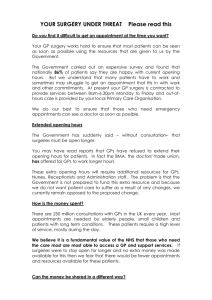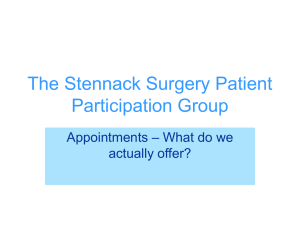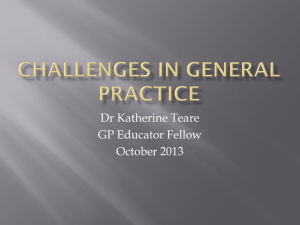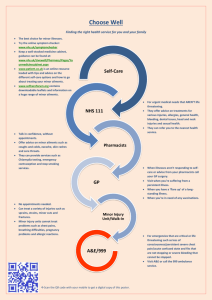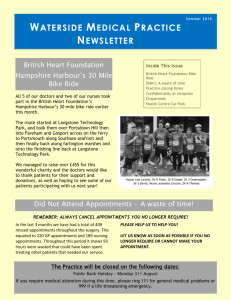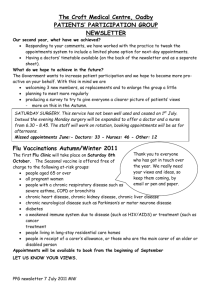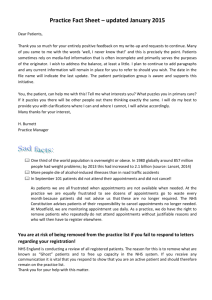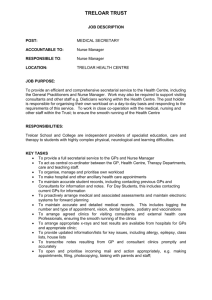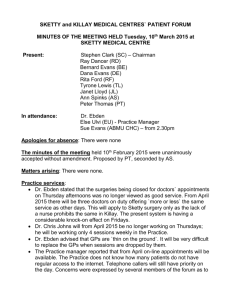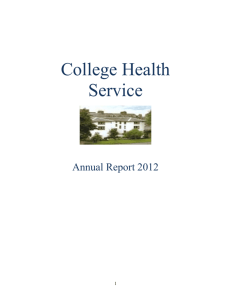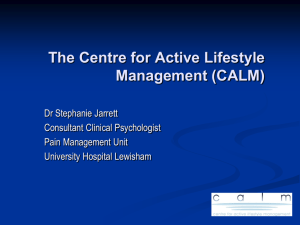Newsletter - June 2014 - Much Wenlock & Cressage Medical Practice
advertisement
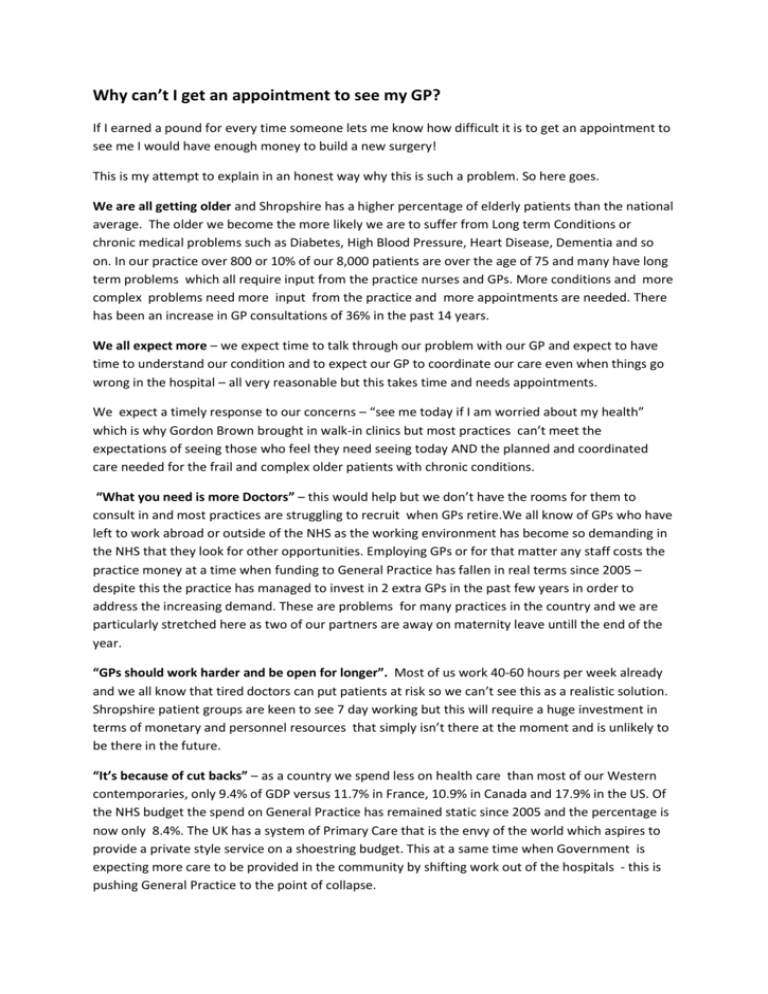
Why can’t I get an appointment to see my GP? If I earned a pound for every time someone lets me know how difficult it is to get an appointment to see me I would have enough money to build a new surgery! This is my attempt to explain in an honest way why this is such a problem. So here goes. We are all getting older and Shropshire has a higher percentage of elderly patients than the national average. The older we become the more likely we are to suffer from Long term Conditions or chronic medical problems such as Diabetes, High Blood Pressure, Heart Disease, Dementia and so on. In our practice over 800 or 10% of our 8,000 patients are over the age of 75 and many have long term problems which all require input from the practice nurses and GPs. More conditions and more complex problems need more input from the practice and more appointments are needed. There has been an increase in GP consultations of 36% in the past 14 years. We all expect more – we expect time to talk through our problem with our GP and expect to have time to understand our condition and to expect our GP to coordinate our care even when things go wrong in the hospital – all very reasonable but this takes time and needs appointments. We expect a timely response to our concerns – “see me today if I am worried about my health” which is why Gordon Brown brought in walk-in clinics but most practices can’t meet the expectations of seeing those who feel they need seeing today AND the planned and coordinated care needed for the frail and complex older patients with chronic conditions. “What you need is more Doctors” – this would help but we don’t have the rooms for them to consult in and most practices are struggling to recruit when GPs retire.We all know of GPs who have left to work abroad or outside of the NHS as the working environment has become so demanding in the NHS that they look for other opportunities. Employing GPs or for that matter any staff costs the practice money at a time when funding to General Practice has fallen in real terms since 2005 – despite this the practice has managed to invest in 2 extra GPs in the past few years in order to address the increasing demand. These are problems for many practices in the country and we are particularly stretched here as two of our partners are away on maternity leave untill the end of the year. “GPs should work harder and be open for longer”. Most of us work 40-60 hours per week already and we all know that tired doctors can put patients at risk so we can’t see this as a realistic solution. Shropshire patient groups are keen to see 7 day working but this will require a huge investment in terms of monetary and personnel resources that simply isn’t there at the moment and is unlikely to be there in the future. “It’s because of cut backs” – as a country we spend less on health care than most of our Western contemporaries, only 9.4% of GDP versus 11.7% in France, 10.9% in Canada and 17.9% in the US. Of the NHS budget the spend on General Practice has remained static since 2005 and the percentage is now only 8.4%. The UK has a system of Primary Care that is the envy of the world which aspires to provide a private style service on a shoestring budget. This at a same time when Government is expecting more care to be provided in the community by shifting work out of the hospitals - this is pushing General Practice to the point of collapse. “Why can’t I pay to see a GP?” – this is a debate that no Government has been prepared to have but more people and some Doctors are starting to realise that the NHS will need another source of funding before too long as the current situation is unsustainable. “GPs have too many other commitments” – when we are not at our desks we are not on the golf course as the press would suggest – we all have other responsibilities with education – teaching medical students and Doctors in training; with the Clinical Commissioning Group helping to shape and improve the local health economy; in the hospital Ear Nose and Throat department providing expertise to their clinics; to the Severn Hospice looking after their terminally ill patients; to our overseas students at Concord College, to our GPs providing Appraisals and mentoring; a requirement for our own professional development or training; to Shropdoc forming an essential part of the out of Hours service and so on. Internally we all have managerial responsibilities for the day to day running of the practice and responding to the needs of the NHS, Care Quality Commission, our patient group etc etc. If these are the problems then what are the solutions? We are always looking at ways of improving things at Much Wenlock and Cressage surgeries including our move from the historic model of “Open Surgeries” many years ago to our current hybrid of “same-day” appointments and booked appointments. We have streamlined the appointments for chronic conditions and have reduced unnecessary GP appointments for medication reviews which often seem a waste of time from the patient’s point of view and we have some later evening appointments as well as running Saturday morning flu clinics in the Autumn. We are using telephone consultations more but as patients we can often feel “short-changed” by not having a face-to-face meeting. We may all have to accept this as a different way of working rather than a reduction in service. We use triage ( sifting or prioritising) to help identify how quickly someone needs to be seen in surgery or at home or whether they might need some advice over the phone. As individuals we all need to use our appointments responsibly and where possible seek advice from other sources such as the local pharmacist or websites such as NHS Choices or Patient.co.uk Dr Colin Stanford Senior Partner Much Wenlock & Cressage Medical Practice
